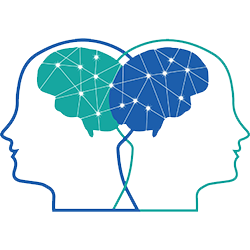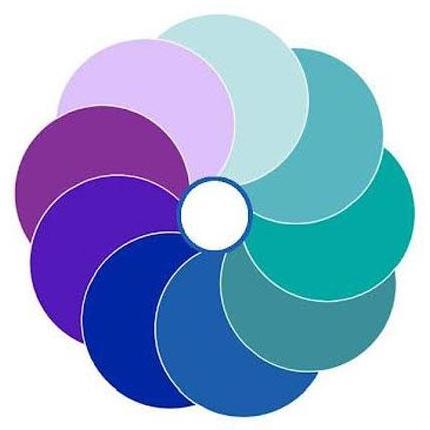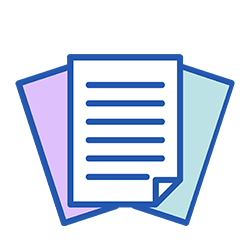About Brain Injury
An acquired brain injury (ABI) occurs after birth. It is not hereditary, congenital, degenerative, or induced by birth trauma. There are two types of acquired brain injury: traumatic and non-traumatic. "A Traumatic Brain Injury (TBI) is caused by a bump, blow or jolt to the head or a penetrating head injury that disrupts the normal function of the brain." CDC There are 2.8 million TBIs in the US each year. Problems from a brain injury may be physical, cognitive, emotional or behavioral and may last from a few days to the rest of someone’s life. Examples of non-traumatic brain injuries include stroke, infection, tumor, or anoxia (lack of oxygen from something like strangulation, near drowning or drug overdose).
Brain Injury Intersection with Other Systems of Support
Below are just some of many intersections between brain injury and other diagnoses.
Mental Health: Brain injury can create mental health issues, as well as worsen pre-existing ones. They can make coping harder. Six months to 1 year following an injury: one third will experience a mental health problem – that number will grow over time. People with BI have a 2 - 4 times increased risk of attempting or having death by suicide. As high as 75% of people seeking mental health and substance use treatment also have a brain injury.
Substance Use Disorder: People with TBI are 10 times more likely to die of accidental overdose. Approximately HALF of people receiving substance abuse treatment have at least one brain injury. 25% of people enter brain injury rehabilitation as a result of drugs or alcohol. Those with childhood TBI are more likely to abuse drugs & alcohol as adults. For every overdose death, there are approximately fifty overdose survivors, 90% of whom become impaired because of insufficient oxygen to the brain. As high as 75% of people seeking mental health and substance use treatment also have a brain injury.
Domestic Violence: An estimated 20 million women each year could have a TBI caused by DV. Survivors of DV with a TBI are likely to have trouble with attention, concentration, memory, executive functioning and processing information. These changes make it harder to assess danger, make decisions related to safety and adapt to living in a shelter.
Justice System: Within 5 years post injury, nearly 1/3 report some involvement with criminal justice. Of those in the Juvenile Justice System, 41% have had a TBI. They are likely to sustain more injuries as they age. With TBI, they are at a 69% higher risk of recidivism. In the adult Justice System, 50-80% have had a TBI. People with TBI are 12 times less likely to achieve discretionary release. Close to 100% of women in the justice system have a history of TBI.
Homelessness: TBI is both a cause & consequence of homelessness. Over half of those who are homeless or are in an insecure living situation have a TBI (25% were moderate to severe brain injuries – 10 times higher than the general population.) They have poorer general health and functioning than people who are homeless without brain injury.
Chronic Pain: Pain is the most common chronic medical condition reported by people with TBI. Over half develop chronic pain. Common problems following brain injury, like poor judgment, memory changes, and impulsivity make it harder to self-regulate substance use & make overdose 11 times more likely.
Child Abuse: 30 - 60% of perpetrators of domestic violence also abuse children in the household. Abusive Head Trauma includes Shaken Baby Syndrome.
ACEs/Trauma: Sustaining a brain injury in childhood or living with someone with a brain injury may be experienced as an ACE. Some ACEs can cause brain injury.
Screening for lifetime history of Brain Injury is recommended as a regular part of the intake process because of the pervasiveness of Brain Injury in the above groups.
Brain Injury Information & Resources - Many of the resources below may also be helpful for people with developmental brain-based conditions.
Screening Tools
Screening Tools for Lifetime History of Brain Injury - Five tools covering all ages for professionals, includes one for parents.
CHATS Screening Tool - Designed specifically for domestic violence settings by the Ohio Domestic Violence Network based on the HELPS tool.
Tools for Developing Strategies/Accommodations for Brain Injury
MINDSOURCE booklet - Cognitive Strategies for Community Mental Health (relates to other populations as well). Contains a set of one-page tip sheets to address cognitive changes in the areas of memory, slow or delayed processing, attention, disinhibition/impulsivity, physical and sensorimotor, language impairments, organization, mental inflexibility and emotional dysregulation.
504/IEP Accommodations and Modifications in the Classroom for a Student with Traumatic Brain Injury - The Center for Brain Injury Research and Training (CBIRT)
Brainstorming Solutions Tool - Helpful template for gathering information on person's skills and challenges to facilitate development of solutions.
Strategies and Accommodations Tool - Use the Brainstorming Solutions Tool (BST) (above) first, to help you figure out the person’s strengths and weaknesses. Then use this tool (SAT) to check off the strategies that might be helpful for each area you identify on the BST.
Key TBI Resources
Brain Links’ Service Provider Toolkit - Tools for developing plans and services; mental health information and factsheets; domestic violence; returning to school and work; residential resources; family and caregiver resources; social media; professional development; programs and resources.
Brain Links’ Survivor, Family and Caregiver Toolkit - Essential resources; signs, symptoms and factsheets; mental health; domestic violence; behavior; returning to school and work; family and caregiver resources; financial and residential resources; Spanish resources, social media.
When Concussion Symptoms Are Not Going Away - The key resource to hand out to persons served and families to help them understand potential problems following concussion and options for what to do. Age-based. (Also available in the toolkits.)
Brain Links – Educational resources for professionals and all ages served.
TN TBI Program - TBI Information hotline 1-800-882-0611, regional TBI Service Coordinators, Brain Injury Listserv.
Referral Resources
Traumatic Brain Injury Services Directory and Resource Information Guide 2022-2023
A Guide to Possible Changes After Brain Injury – both contain symptom-specific referral suggestions
Key TBI Resources for Specific Systems of Support
Domestic Violence – Multiple resources from the Ohio Domestic Violence Network.
ACL Behavioral Health Guide: Considerations for Best Practices for Children, Youth and Adults with TBI - Information on Brain Injury, Mental Health and Substance Use. The guide also addresses homelessness, domestic violence and justice.
Brain Injury and Child Welfare Best Practice Guide: Information and Tools for State Agencies
Traumatic Brain Injury and Substance Use Disorder: Making the Connections – SAMHSA Toolkit for traumatic brain injury (TBI) and substance use disorders (SUD) to expand the capacity to address both issues in treatment.
Disability Rights North Carolina TBI Justice Database - The country’s first national database on TBI and Justice. Centralizes information on criminal legal system-related brain injury screening and supportive service programs, including pilots, academic studies, and projects from the past 30 years.
Infographics
Six Types of Concussion – Infographic and fact sheet on the six types of concussion, developed by the University of Pittsburgh Medical Center and Brain Links.
Brain Injury Association of America (BIAA) Infographics and Factsheets
Mental Health and Brain Injury
TBI and Intimate Partner Violence
TBI in the Youth Justice System
Trainings Available
Brain Links Trainings - Customized training provided at no cost
Brain Links YouTube Training Channel - Variety of playlists
Domestic Violence - Seven part series on Strangulation, Traumatic Brain Injury and Domestic Violence
Brain Injury Alliance of New Jersey - Factsheets, videos, free training
The Ohio State University Wexner Medical Center training modules for professionals
Colorado Kids with Brain Injury Presentations
Alabama TBI Online Learning Select topics by using the top tab for contents including: The Justice System and TBI, Substance Abuse and TBI, Cognitive and Behavioral Consequences of TBI
TN Brighter Futures groups that are a part of this System of Care:
Brain Links, TN TBI Program, TN TBI Advisory Council, TN TBI Service Coordinators





